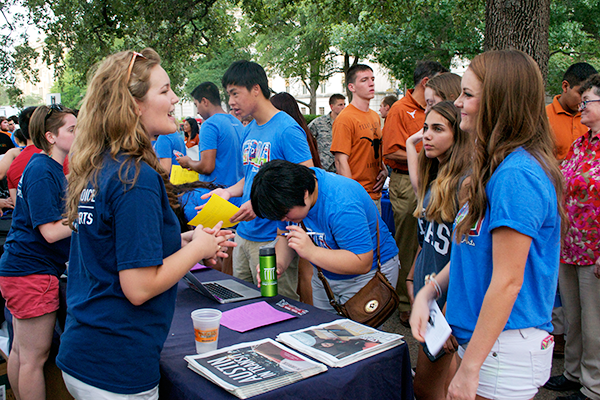Rachel Osterloh, a philosophy and government junior from Boise, Idaho, has stepped into the Liberal Arts Council‘s main leadership role this year. In the following Q&A, Osterloh gives us insight into the importance of the LAC, where the organization is headed this year and her proudest moments as a UT Austin student.
What motivated you to run for president of the Liberal Arts Council?
The people in LAC perpetually inspire me. LAC is composed of unique, dedicated and passionate members who strive to create tangible positive changes to the College of Liberal Arts and overall student experience. After consulting with people in the council, I decided to take the leap and run. I’m honored to serve as the Liberal Arts Council president for the 2014 to 2015 year.
How did you first get involved with the LAC?
I became involved with LAC the first semester of my freshman year.
Why should other students get involved?
LAC, fundamentally, functions on the principle of servant leadership. As council members, we represent our liberal arts constituents to the fullest of our abilities. Passionate student advocacy not only benefits the community, but also fosters leadership within the participating individual. Furthermore, LAC offers multiple opportunities for leadership. Whether one is interested in volunteering with children at the Boys and Girls Club, or selecting winners for academic scholarships, LAC is a niche for many successful students.
What are the plans for the LAC this year?
Right now, LAC is focusing on Liberal Arts Week. Our Liberal Arts Week theme is “Read All About It.” Our committee chairs have intriguing and thought-provoking events planned, and I look forward to seeing them come to fruition. Other initiatives we have planned for the year include a transfer student Town Hall, a LAASO summit, awarding fall and spring study abroad scholarships and continuing to strengthen the nexus between LAC and the Liberal Arts community.

What are you most proud of from your time at UT Austin so far?
After countless hours of study, I survived Constitutional Interpretation with Professor Perry. This class was undeniably the most difficult course I have tackled at UT, but the class taught me vast amounts about how to analyze court decisions and critically think. I had never been that academically challenged, but am incredibly grateful for the skills I learned.
What are your professional ambitions after graduation?
I plan on pursuing a joint J.D. and M.A. program following graduation. Eventually, I plan on becoming a professor in the field of political philosophy.
What has studying liberal arts meant to you?
If one studies liberal arts, one truly becomes a citizen of the world. While natural sciences majors may keep us alive, liberal arts majors teaches us how to live. We are leaders, teachers and anything we desire to be.
To learn more about the Liberal Arts Council, visit their website, follow them on Twitter @utlacouncil or like their Facebook page.
